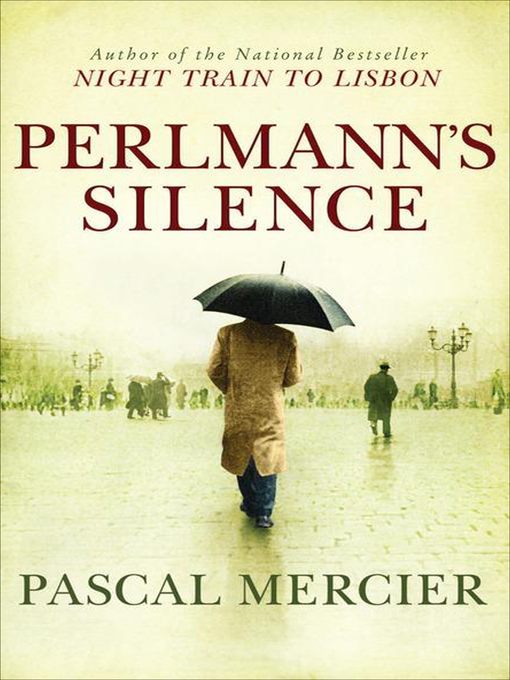
Perlmann's Silence
- اطلاعات
- نقد و بررسی
- دیدگاه کاربران
نقد و بررسی

November 14, 2011
Philosophy professor Mercier’s second novel, originally published in Germany in 1995, explores depression and the desperation born of procrastination. Philipp Perlmann, a prominent professor and linguist, is in charge of a monthlong academic conference at a retreat outside the seaside town of Rapallo, Italy. Each participant must debut a new theory, and Philipp—paralyzed with ennui and writer’s block—relies on sleeping pills, a local trattoria, and his memories as means of escape. Then, after translating a Russian colleague’s manuscript, Philipp decides to pass it off as his own to meet the conference deadline. When the colleague unexpectedly decides to join the group, Philipp takes extraordinary measures to protect his secret. Unfortunately, as readers journey through his cowardice and deteriorating mental state—and the novel’s endless exposition—Philipp proves both unreliable and unlikable. Even more introspective than Night Train to Lisbon, Mercier has allowed his protagonist’s rumination to bury the novel’s other elements.

January 1, 2012
A slow-moving portrait of grief and dislocation by the author of the fast-moving Night Train to Lisbon (2007). The Perlmann of the present novel—Swiss author Mercier's first book, published in German in 1995—is a German linguist, the master of several languages, who has recently lost his wife and, with her, his interest in much of anything that has to do with his former life. Once he had been passionately committed to the world of language and the mind, even disengaging from his parents over their insistence on speaking their native Plattdeutsch ("they were increasingly led simply by the phrases and metaphors of the dialect, and by the prejudices that were crystallized in it"). Now Perlmann hangs around his apartment, avoiding the work he is supposed to be doing. All that changes when, at one of the conferences Perlmann still constantly attends, an Italian linguist, now employed by industry, recruits him to become part of a think tank of scholars devoted to questions of how language affects mind and vice versa. Perlmann finds himself out of his element in the political jockeying of the para-academic group, where battles of one-upmanship are played out with cigarette packs (this is Europe, after all, and everyone smokes); moreover, he's frozen when he finds himself called on to deliver a keynote address, finally turning in desperation to the work of an unsung scholar that he thinks he can pass off as his own. Plagiarism thus hatched, Perlmann breathes a little easier—until, that is, he learns that the source of his stealing has scraped up the rubles necessary to travel to the conference. Writes Mercier, "There was only one thing he hadn't thought about: that Leskov was a flesh-and-blood human being with his own will and pride." The setup is worthy of a David Lodge or Malcolm Bradbury, but Mercier lacks the humor of either of those English satirists; instead, the novel settles into a kind of slow funk, the literary equivalent of moping, as Perlmann wrestles with what to do next, surprised by his own torpor and reluctance. But for readers of a philosophical bent, appreciative of slowly unfolding, elegant tales, this will be a pleasure.
(COPYRIGHT (2012) KIRKUS REVIEWS/NIELSEN BUSINESS MEDIA, INC. ALL RIGHTS RESERVED.)

August 1, 2011
Remember Night Train to Lisbon? It sold millions throughout Europe and was a San Francisco Chronicle and a Los Angeles Times best seller as well. Mercier's new work features linguist Philipp Perlmann, on the verge of presenting a speech to a gathering of colleagues near Genoa but unable to prepare; he's still mourning the death of his wife. So he plagiarizes the work of a Russian colleague--who unexpectedly arrives at the event. Good setup, and the writing seems tart and to the point; certainly buy where folks liked Lisbon. With a reading group guide.
Copyright 2011 Library Journal, LLC Used with permission.

Starred review from January 1, 2012
Invited to speak at an international conference, renowned linguist Philip Perlmann finds himself so paralyzed by grief over his wife's recent death that he can scarcely write a word. When he solves his problem by plagiarizing from a manuscript by a brilliant foreign colleague, he finds himself trapped in an impossible dilemma after the colleague unexpectedly decides to attend the conference. Mercier draws his readers into this dilemma in a narrative taut with lethal intentions, rich with literary and linguistic implications. The implications intensify as Perlmann weighs every syllable exchanged with his now-threatening but still naive and trusting colleague, striving to keep his scholarly theft hidden, his reputation unscathed, yet hating his own deviousness. As they share agonizing days with the protagonist, readers plumb the depths of a mind endowed with rare power, a heart lacerated by tempestuous emotions. On the tightrope Perlmann walksbalancing guilt with self-justification, perilous dangers with desperate hopesreaders gain a perspective on how words unite and divide their speakers, how meanings and motives metamorphose in crossing the boundary of translation. That Mercier's own acclaimed novel has itself traversed the boundary from German to Englishthanks to the gifts of translator Whitesidewill occasion considerable gratitude among American readers.(Reprinted with permission of Booklist, copyright 2012, American Library Association.)




دیدگاه کاربران